You can cheap out on these 5 tools
When do-it-yourself types talk about tools, they usually fall into one of two groups: Those who declare that premium tools are the way to go, and those who argue that, based on the average quality of today’s tools, paying more just isn’t worth it. The truth likely falls somewhere in between, especially once you consider that some tools get picked up more often than others. Still other tools, if they fail, have unusually high consequences.
When assembling their toolbox, everyone has a budget. Where can you cut a few corners, perhaps to justify buying a few higher-end ones? We dug around and found five garage must-haves. With these, the budget option carries no penalty—and just might be your best bet.
Pliers
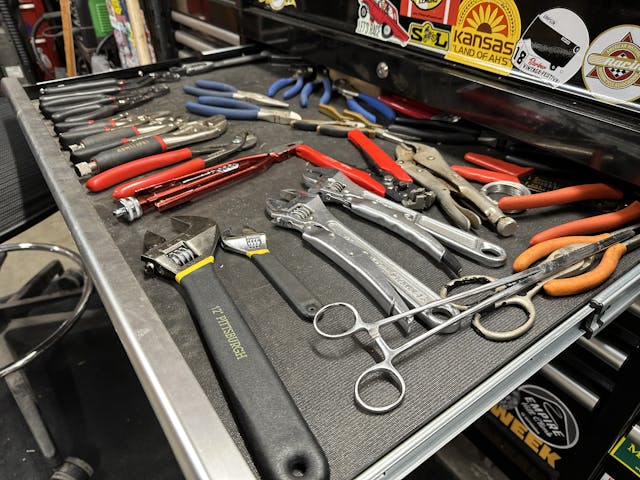
I own some pricy pliers, and I’m constantly passing them over to grab a cheap set, one that can get little damaged or soaked in oil and not make me feel guilty. Does that mean I am too protective of my “nice tools?” Maybe, but it also means I probably could get by with only the budget-friendly option.
Remember those Snap-On pliers that made the rounds on social media awhile back, the ones you could use to pick up a nickel by its edge? Let’s call a gimmick a gimmick. In a home shop, you rarely need the precision offered by those pliers. They are likely easily damaged if used improperly, too.
Hacksaw
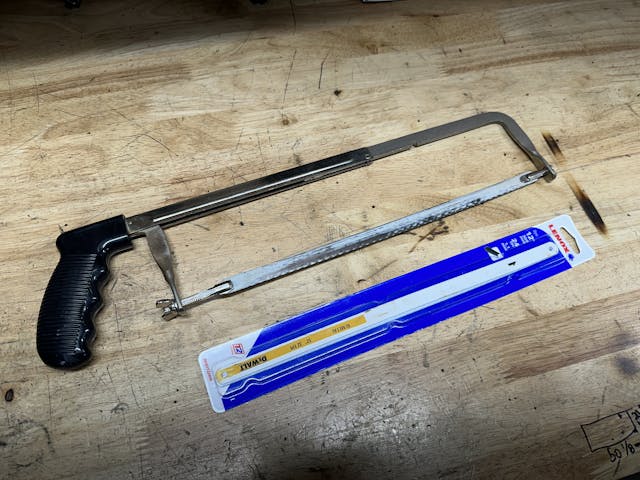
Saw blades are a place to shell out, but the actual hacksaw? Even the cheapies seem to last long enough to crop up at estate sales. After all, there aren’t many ways to improve on the recipe: a metal frame, plastic handle, and threaded adjustment for the blade tension.
Hacksaws can be found for as little as $5 or $6, and those of us who just work on cars at home are unlikely to notice or truly appreciate the more expensive options.
Flashlights
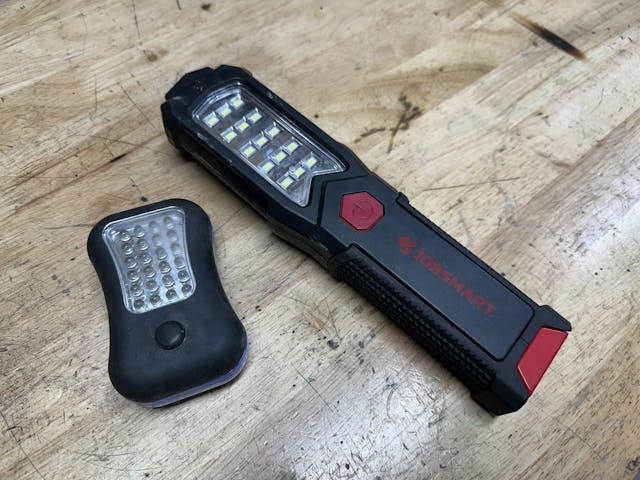
At some point, light is light. Flashlights can get expensive, and while it’s very likely some are worth the premium, most are just the same switches and bulbs in a “fancier” case. I’ve never needed a truly waterproof flashlight in my garage. I’ve never needed to use one as a hammer, either.
If taken care of with even a small amount of respect, like keeping fresh batteries installed to keep the corrosion out, cheap lights work for a long time at practically no cost.
Extensions
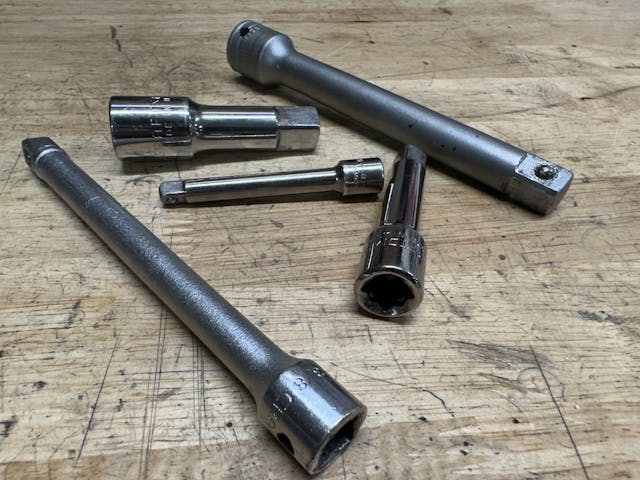
Not extension cords, but socket or ratchet extensions. So long as the machining for the two precision parts—where the ratchet and socket engage—is right, you’re pretty well good to go. Again, when used properly, extensions aren’t going to wear out: If you’re using hand tools, you’re unlikely to put enough torque on a garden-variety one to twist or break it.
(You shouldn’t be using one as a punch, anyway. We know you’ve never done that. Right?)
Organization
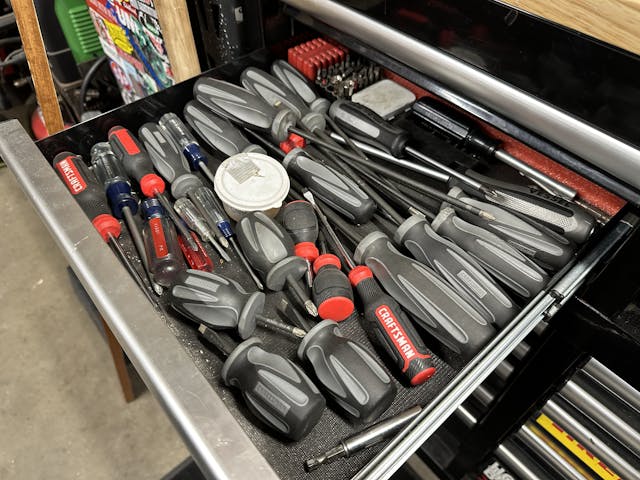
At the end of the day, your toolbox is your toolbox. If you know where things are, that is good enough. Some people prefer borderline- over fully organized tool storage, but we all find what works for us.
When you’re pinching pennies, fancy organizational inserts are low-hanging fruit. There are also a lot of truly budget DIY solutions for toolbox organization that require only medium effort.
***
There is a fine line between buying the right tool for the job and spending so much on tools you don’t have anything left for the actual project. Sometimes a tool’s value doesn’t align with its price. Be a little frugal: At first, you might feel like you’re cutting corners, but after a while, you’ll notice the cash saved, and your wallet will be better prepared for that last-minute Marketplace purchase that “just needs carb work.”
***
Check out the Hagerty Media homepage so you don’t miss a single story, or better yet, bookmark it. To get our best stories delivered right to your inbox, subscribe to our newsletters.
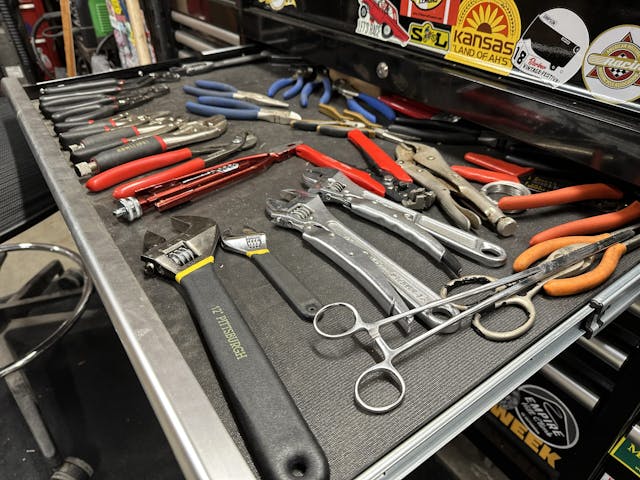


For the most part, Kyle is correct here. I’ve found this to be an ultimate truism. You can break 2 cheap tools for the cost of one expensive one (generally). Only you can decide which is economically right for you. But don’t use any tool that is so cheap that it either damages what you’re working on, or endangers you! Cheap wrenches and screwdrivers, for instance, and wreak havoc on fasteners. A cheap hammer or punch could shatter and harm you.
When I was wrenching for a living (as a night mechanic), priority number one was that the tool does not break – even under some abuse. When it is 3 in the morning, and you have a half disassembled semi that is scheduled to disembark at 6, breaking a tool can become real problematic real fast, and running out and exchanging your ‘lifetime warranty’ saturday afternoon mechanic tool for the fifth time is not an option
I agree with extensions – I have wielded a lot of abuse through off-brand extensions with a limited number of failures.
Pliers and lights – disagree. What makes a good plier is hardened sharp teeth. Lights have to be able to survive a drop or two and can’t start cracking apart the first time they are doused in oil or gasoline. I also find that the cheap ones have cheap hooks and tend to put the on/off switches right in a location where you will continually turn it off every time you prop it where you need it
And grind the edges of your punches and chisels as they mushroom.
If you don’t have rust-state cars, you probably don’t experience this.
Whole I generally agree, don’t forget another cost of cheap tools: time. When the cheap tool breaks (and it WILL break at the most inopportune time) you’ve gotta stop the work, get cleaned up, make a trip to the store for another tool, and then get back to it.
I once saved some $$$ buying a cheap 3/4″ breaker bar that I’d need probably only one time. After it broke on the first use, had to haul it back for a refund, go to a different store for a better-quality bar, then head home. Just a time-wasting PITA.
My 1/2″ Craftsman breaker bar lasted me over 20 years of constant (abusive) use. Finally gave up on my F350. It’s replacement is still sitting unused in my toolbox. I’ve gotten older, and maybe less abusive.
I bought my wife a set of screwdrivers after she had used one of my Klein insulated screwdrivers to open a paint can, and used it as a hammer to reseal the lid.
Ohhh, the Humanity……
I do not agree on pliers oe extensions.
Lower quality often leads to poorer metal and rust.
I have some Harbor Fright extended needle nose that are in a good tool box in a heated shop and they just like to rust.
Yet my Channel lock tools look like new.
For pliers I plan to use a lot I’ll spend money for great ones. I like Knipex. One their channel-lock style a few times and you won’t want to be without them
I agree…Knipex pliers are well worth it.
I came to the comments just to say that. Love my Knipex
Once you have a set of Knipex side cutters you will pass over all your other box store brand side cutters to find and use them.
Agree knipex are one of the most universal and indestructible tools in the arsenal.
Every toolbox should have a pair of hemos in it
Agreed. I have three pair in varying sizes. Use one more than the others, but all are valuable tools to me.
What is a ‘ pair of hemos’?
Hemostat. A really mean set of clamping pliers.
Medical pliers with latching tabs on the handle to lock them closed on whatever you have in the jaws.
You’ll understand the first time you get some skin caught in them.
The picture above shows a set in the open toolbox drawer near the bottom right of the pic.
Back in the day, Hemos were also called ‘Roach Clips’
That was alligator clips.
Although I avoid Chinese-made tools for several reasons, I have noticed that even cheaper tools are much better than they used to be. The old cheaper socket sets were made of some metal that really was as soft as aluminum. Maybe zinc, but they were useless. Cheap sockets now are really nice, polished and strong.
I have to push back on extensions. The little “detent ball” fails on the cheapies, ask the bridge of my nose & forehead when laying on my back under a car. A couple of times of that and all the cheapies became “punches” or trash. No more cheapies in my toolbox.
Having had an assortment of cheap and quality tools I have to disagree on the hacksaw. I always had trouble getting a straight cut until I used a Snap-On. I was amazed that it cut like a saw is supposed to and bought one the next week.
After decades of using cheapo hack saws, the Big Blue store has some nice ones on a mark down last winter so I bought one. What a huge difference. Should have bought a good quality hack saw years ago. Holds the blade like a violin string tight. Cuts like nobody’s business even with not the most expensive blades. Cheap hack saw does not belong on a cheapo list of tools, not worth the cheap price.
I totally agree with MarineBob. The style of hacksaw pictured is crap. I like the cantilever style, that tightens the blade from the top. They hold the blade much truer and tighter.
The price of a quality hacksaw blade demands a commensurate frame
Sorry Kyle… Can’t agree about the hacksaw. Cheap handles allow the blade to twist resulting in an off angle cut.
I was going to say that.
If you want to see how a real Pro handles a hacksaw and you are unaware of Allen Millyard check out his video of how to make a Kawasaki V-12 engine. An astonishing craftsman.
https://www.youtube.com/watch?v=FnXUx4cYdHA
And as for organization… I have one of those organized, OCD toolboxes. And for years I worked alongside a mechanic who wasn’t. He lost time poking around for the right tool – I lost time carefully putting them all away. Only advantage to organization is knowing when you have a missing tool. And if you have EXPENSIVE TOOLS, that can be very helpful! Now where is that 14mm Snap-On 6 point Wrench???
Sorry you are so wrong, Cheap tools like pliers, wrenches and screwdrivers are much harder to use and leave a mess on anything they touch, damaged fastners, rounded over edges and heads, broken fastners etc. As for consumables they are not always a savings in the long run and again leave a mess. Craftsmanship requires more!
Yes, Mr Bill I agree with you 100% on this. Quality tools make the job easier and more efficient.
I think how much you spend on tools depends on how much you use them. A tradesperson needs tools they can rely on to do the job and therefore they need a good quality tool. And, as a tradesperson you usually cannot afford to go full out on a fully kitted garage full of SnapOns. You quickly learn what tools are decent for a decent price. The average “hobbyist” is more likely to over-spend on tools because it makes them feel more legit.
What quality you need does not depend on how much you use the tool. It depends on the importance of the work.
You have many things that make a big difference between damaging what you are working on or getting injured versus success and safety.
Anyone who says different is misguided.
Yep. Agree with pretty much everything you say here. Harbor Freight is a decent option for consumables like shop rags and sandpaper. I’ve also bought stuff like really large adjustable wrenches and overly long extensions that you’ll probably never need again, but just have to have to get that one project finished up. I don’t generally buy anything with moving parts from them, though. I do absolutely LOVE those little blue oval flashlights that they give away during sales or with a coupon. Probably have twenty of them around the house and garage.
I find that a wonderful place to acquire tools – sometimes even very expensive versions of them – is at estate sales, yard sales, and flea markets. Whenever I’m at any of these, I head straight for any tools they might have – I mean, you gotta keep a travel box for each car stocked with essentials too, right?…
When I started my first-ever job wrenching I had no mechanic-type tools at all. My boss/shop owner took me to the industrial ‘surplus’ store for a cheap set of tools – with the idea being that as you learned which you would use and broke them or wore them out, you replaced them individually with Craftsman. When I moved to the Volvo dealership I drank the Snap-On kool-aid. The informal rule there was that you could borrow something one time, and then buy your own when the truck visited next. When I opened my own place, I chose the middle ground. So – nothing matches but everything is functional.